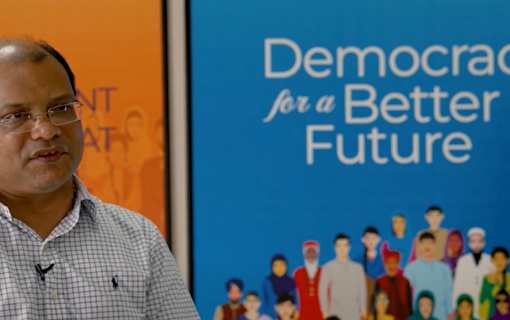Republic of Kyrgyzstan, Final Project Report: USAID Cooperative Agreement, Oct 1, 1997 to Sept 30, 2002
INTRODUCTION
Under Cooperative Agreement EE-A-00-97-00034-00, the International Foundation for Election Systems conducted a number of projects designed to support its ongoing mission in Kyrgyzstan of supporting democratic development though support for electoral sector reform, emergence of civil society, and civic education. The Agreement spanned the formal opening of an IFES country office in Bishkek in the Fall of 1997, and witnesses support activities for elections at all levels in the country over a three-year span. The Agreement also encompassed a number of activities designed to assist local, non-governmental organizations' development, building upon the successful "Strategies for Citizen Involvement" program completed by IFES under the prior agreement. At the end of the Agreement, the tone was set for future work as IFES began to delve into an ambitious initiative to support civic education for high school and college-age students through the development of a textbook and accompanying materials, and student hands-on activities such as Democracy Summer Camps.
IFES fortified traditional electoral partnerships during this period as well as establish an array of new partnerships in the civil society and civic education sectors. The Central Election Commission and IFES developed a close working relationship after the appointment of Chairman Sulayman Imanbayev, who was installed as CEC Chair in 1996. The IFES-CEC relationship, initiated with IFES'S arrival in 1993 for its first Pre-Election Technical Assessment (PET A) had been wavering in 1995-1996 as a result of the strict direction taken by Chairman Mambendzhus Abylov, who succeeded Markil Ibraev as Chair not long before the December 1995 presidential elections. In 1997 Kyrgyzstan embarked on a State Program for the Reformation of the Electoral System of the Kyrgyz Republic, which envisioned a top-to-bottom remaking of the system of conducting elections in the country, including establishment of a codified election law, computerized system for reporting results, new initiatives to educate voters, and establishment of clearer guidelines on the CEC relationship with lower level commissions. A working group of lawyers was set up to oversee the revision of the election code governing federal elections and referenda. It was with this group that IFES initially conducted much of its election law development work.
NGO partners forged during the Strategies for Citizen Involvement series were maintained, and new local partners were formed for conducting training of election observers, student activities, voter education projects, public opinion surveys, media monitoring, and textbook development. The NGO resource organization InterBilim began as the primary local partner, and by the end of the Agreement the number of local partners had increased greatly and included the Coalition of NGOs. Partnerships were forged with universities, schools and individual teachers and professors in support of the civic education program, and with the Ministry of Education and other governmental education institutions.
IFES worked in partnership with a number of international NGOs as well in the conduction of its projects, with both USAID-funded and non-USAID entities. Major partners from the USAID family included the National Democratic Institute for International Affairs, the American Bar Associations' CEELI project, the Academy for Educational Development/Global Training, Interviews, the Urban Institute and the Counterpart Consortium. Non-USAID partnerships tended to focus around the elections work, and included the Organization for Security and Cooperation in Europe, the United Nations Development Program, the Soros Foundation/OSI, Helvetas, International IDEA, and others.
The following report is designed to provide a comprehensive, theme-oriented overview of IFES' work under this Cooperative Agreement in Kyrgyzstan, from 1997-2001. Work under this agreement was conducted post-September 2000 under the no-cost extension to the Cooperative Agreement as granted by USAID. Funds were ostensibly burned out in early 2001 after post-presidential election projects wrapped up.









